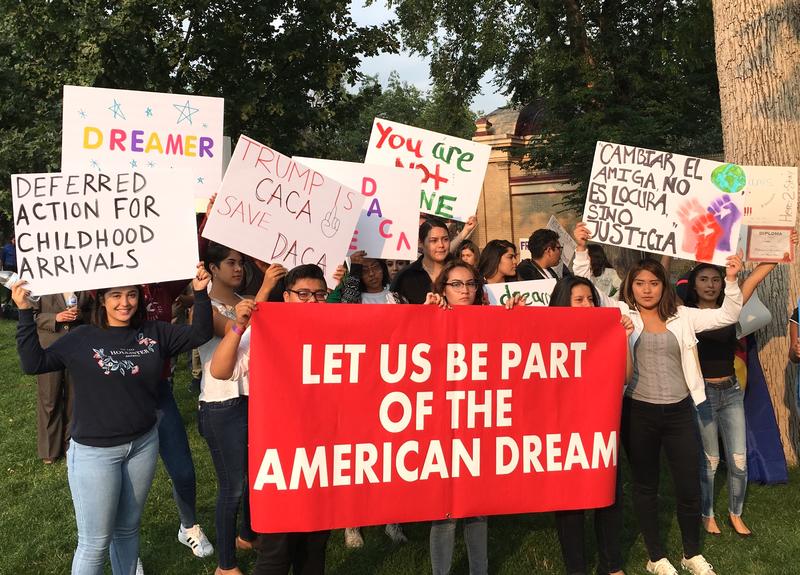DACA Is Helping But Are Young People Too Afraid To Keep Using It

DACA Is Helping But Are Young People Too Afraid To Keep Using It
Patricia Guadalupe reports for NBC that almost all DACA recipients surveyed in a study are in school or working. Yet a majority worry about deportation on a daily basis, even with DACA status.-
“Young immigrants have seen solid wage and job gains under the Deferred Action for Childhood Arrivals program, which allows them to study and work without fear of deportation. Despite the benefits, a significant number of DACA recipients whose protections expire this year have not reapplied, a study released this week has found.
The Obama-era DACA program has clearly brought tangible benefits to its recipients. About 96 percent are in school or working and 78 percent have seen an increase in their average hourly wage, while more than six in 10 were able to buy their first car after enrolling in DACA.
Yet, about 64,000 or four in 10 DACA recipients whose two-year enrollment expires this year have not reapplied, according to the study, released Tuesday by the Center for American Progress, a liberal think tank.
Policy analysts who commissioned the study think that the uncertainty and confusion over the fate of the program may be playing a role. President Donald Trump began a phaseout of DACA last year, but that has been slowed by the courts. A ruling could come as early as this week on a lawsuit brought by several states seeking to have DACA declared illegal.
“There certainly is fear in the community about what might happen if DACA is ended and you submit an application, because just having an application under consideration does not grant you any status — there’s a lot of confusion out there and a lot of uncertainty,” said Philip Wolgin, managing director of immigration policy at the Center for American Progress.
“There are multiple court cases,” added Wolgin, “and there is also a significant cost ($495) to renew.”
Tom Wong, an associate professor at University of California, San Diego, conducted the survey for the Center for American Progress (where he is a fellow), the National Immigration Law Center and United We Dream, both advocacy groups that support an extension of the DACA program until Congress addresses the issue in legislation. Researchers surveyed 1,050 DACA recipients in 41 states and the District of Columbia in an online panel format.
The researchers estimate that only 3 percent of young immigrants who will lose their DACA status sometime next year have submitted renewal applications. Some recipients may be waiting to renew closer to the deadline, as has been the case over the years.
But survey results suggest the Trump administration’s decision last year to rescind the program has caused greater consternation among recipients. A majority of those said they think “at least once a day” about being deported, and 64 percent say they worry about a family member being deported, while 45 percent think at least once a day about being held in an immigration detention facility.
The study out Tuesday coincides with the program’s anniversary. The program grants two-year renewable permits to about 800,000 undocumented immigrants who were brought to the U.S. or stayed in the country illegally as children and allows them to work and study without fear of deportation.
The study offered some good economic news for DACA recipients, finding that the average hourly wage of respondents increased by 78 percent after receiving DACA, from $10.32 an hour to $18.42 an hour. Additionally, 6 percent started their own businesses, and despite some fear and uncertainty in the community, researchers found that nearly half of DACA recipients have become more politically active and 64 percent said they felt more like they belong in the United States.
Most polls show a majority of Americans support DACA.
“And with the American public so clear about how they feel about this and the Republican majority really not taking steps to address this, I have to imagine this will play out” in the midterm elections, Wolgin told NBC News.
“We’ve definitely seen a much more robust, active campaign to make it very clear that these are people that grew up here, that live their lives here, that are making these contributions, that they aren’t going anywhere,” he said. “It’s been their activism and advocacy that has brought this to the public stage.””
Photo Credit JAKE BROWNELL / 91.5 KRCC














